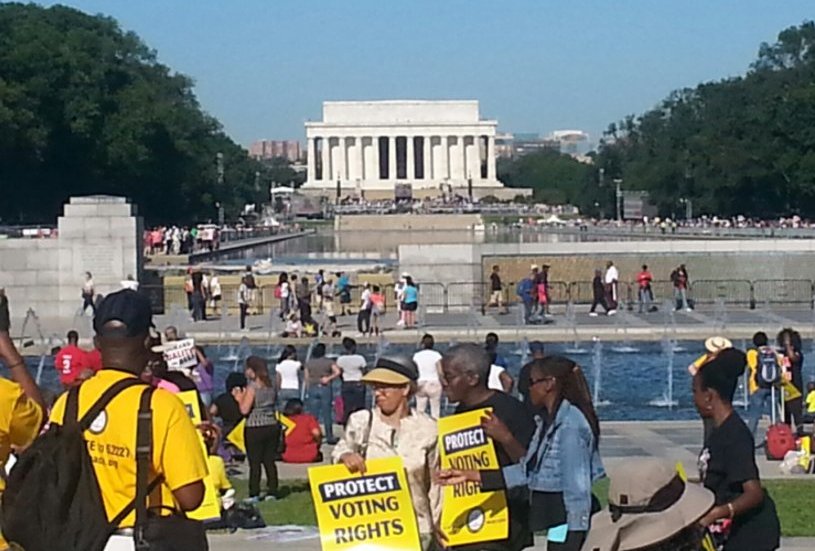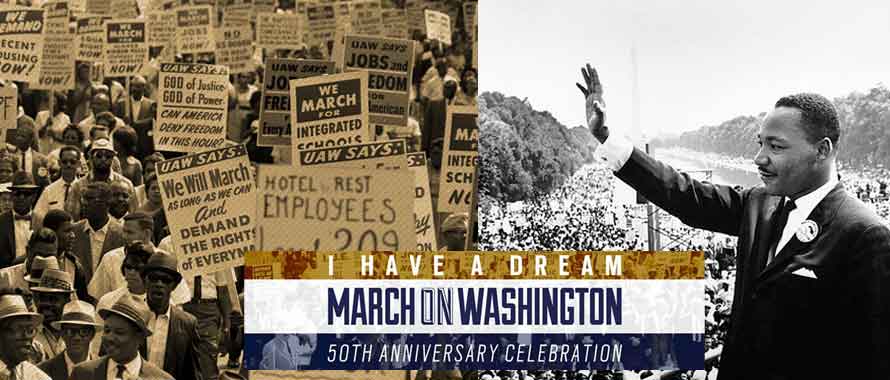Fifty years ago today, Rev. Martin Luther King, Jr. delivered his famous “I Have A Dream” speech, the last one delivered on August 28, 1963, the day more than a quarter million supporters of civil rights converged in the nation’s capital for the March on Washington for Jobs and Freedom.
Alas, I did not get to D.C. for the 50th year commemorative events. Instead, I lived vicariously through the stories of friends who did. I enjoyed news accounts of those who returned 50 years later to marvel at far the country has come since the historic march, and how much further we have to go to realize the powerful words in Dr. King’s speech.
Dr. King and the event organizers undoubtedly understood the power of what they were doing, speaking under watchful gaze of President Abraham Lincoln’s great seated statue. The historic march came in the 100th year anniversary of Lincoln’s signing the Emancipation Proclamation, which strategically freed most Black slaves during the Civil War.
With that historic backdrop, the march and the speech became a landmark spectacle in American history. It was a grand demonstration organized by a network of brave men and women, foot soldiers who committed their lives to the hard work of advancing civil rights for African Americans, and human rights for society’s poor and marginalized people.
USA Today has a wonderful special edition that delves into that historic speech and how the march came to be.
But as the USA Today edition says and Dr. Michael Eric Dyson explained in a C-SPAN interview this morning, the speech has been frozen in time and its deliverer stuck in amber. Our sound-bite society often misquotes his speech without understanding its historical context. And without that, the speech is robbed of its power and meaning.
We act as if his “dream” was only that little Black and White girls and boys could go to the same schools, sit in the same movie theaters and eat at the same restaurants. If that’s the case, then struggle has ended, racism is dead, poverty is defeated, and everybody in America now has an equal chance at success. And the country proved that by voting to put a Black man in the White House, twice. (*Swipe hands together in “mission-accomplished” motions*)
If anyone ever thought the struggle was over, one has only to remember, sadly, the recent Supreme Court decision, that, for all practical purposes, guts the Voting Rights Act of 1965, not even 50 years after “Bloody Sunday” at the foot of Selma’s Edmund Pettus Bridge. For me, the decision was a stark reminder that rights once, “given” as an “entitlement” to a “special group” can be taken away at the whim of those in power who don’t truly understand what Dr. King’s speech and his Dream meant. (Or, maybe those in power DO understand what his speech meant and don’t want that “special group” to make good on enacting Dr. King’s Dream.)
 And while the struggle continues, it appears that today’s leaders don’t seem to have a clear agenda on how to deal with the problems that are almost as pressing as they were 50 years ago: growing poverty and shrinking economic opportunities for the middle-class, quality housing and unemployment.
And while the struggle continues, it appears that today’s leaders don’t seem to have a clear agenda on how to deal with the problems that are almost as pressing as they were 50 years ago: growing poverty and shrinking economic opportunities for the middle-class, quality housing and unemployment.
These things are amplified among African Americans, whose unemployment is double the national average, who lost a huge chunk of their wealth in the Great Recession, and who are still falling further behind academically, and therefore, economically, their peers. And young Black males can’t walk down the street without being labeled a suspect and risk being shot. The statistics are real, measurable and disheartening.
I didn’t hear much in the way of solving these problems during the speeches this weekend or today. There was no soaring rhetoric like Dr. King’s pouring from the hearts of committed 30-somethings and their peers who have boots-on-the-ground strategies to turn the rhetoric into reality.
Don’t get me wrong. I’m glad for the speeches over the past few days from U.S. Congressman John Lewis, President Obama, former Presidents Carter and Clinton, and others about the March on Washington’s 50th anniversary. I’m encouraged that so much media time has been given to commemorate one of the finest hours of American democracy in awesome display. But that was 50 years ago.
What about today? Where is the agenda? What are the goals and what are the strategies to reach them? Are we so hopelessly lost in political sound-bites that inflame illogical passions and stir emotions, that all our talk amounts to sound and fury, signifying the same ol’ same ol’? I would really love to witness some awesomeness of American democracy in my lifetime too.
It’s easy to complain, point fingers and sit back, waiting for some heroic soul to fix these problems and save the day, like people do at the end of a one-hour TV episode or a two-hour movie. Real life is a lot messier and it takes a long time, 50 years or longer, to solve problems like racism and poverty.
But I am looking for more souls like Dr. King, like Rev. Fred Shuttlesworth, Rev. C.T. Vivian like A. Philip Randolph Bayard Rustin or Dorothy Cotton and Ella Baker, like John Lewis and Diane Nash, Medgar Evers, like Presidents John F. Kennedy and Lyndon B. Johnson.
I think I’ll start by looking in the mirror. If you do the same, you might find the heroic soul you’ve been looking for too.

